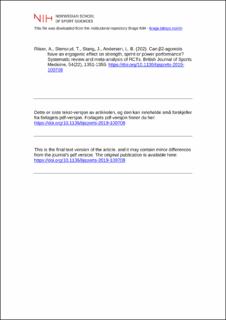Can β2-agonists have an ergogenic effect on strength, sprint or power performance? Systematic review and meta-analysis of RCTs
Peer reviewed, Journal article
Accepted version

Åpne
Permanent lenke
https://hdl.handle.net/11250/2726186Utgivelsesdato
2020Metadata
Vis full innførselSamlinger
- Import fra CRIStin [3604]
- Institutt for idrett, kosthald og naturfag [1006]
Originalversjon
Riiser, A., Stensrud, T., Stang, J., & Andersen, L. B. (2020). Can β2-agonists have an ergogenic effect on strength, sprint or power performance? Systematic review and meta-analysis of RCTs. British Journal of Sports Medicine, 54(22), 1351–1359. 10.1136/bjsports-2019-100708Sammendrag
Objectives: We aimed to examine the effect of β2-agonists on anaerobic performance in healthy non-asthmatic subjects. Design: Systematic review and meta-analysis. Eligibility criteria: We searched four databases (PubMed, Embase, SPORTDiscus and Web of Science) for randomised controlled trials, published until December 2019, examining the effect of β2-agonists on maximal physical performance lasting 1 min or shorter. Data are presented as standardised difference in mean (SDM) with 95% confidence intervals (95% CI). Results: 34 studies were included in the present meta-analysis. The studies include 44 different randomised and placebo-controlled comparisons with β2-agonists comprising 323 participants in crossover trials, and 149 participants in parallel trials. In the overall analyses, β2-agonists improved anaerobic performance by 5% (SDM 0.29, 95% CI 0.16 to 0.42), but the effect was related to dose and administration route. In a stratified analysis, the SDM was 0.14 (95% CI 0.00 to 0.28) for approved β2-agonists and 0.46 (95% CI 0.24 to 0.68) for prohibited β2-agonists, respectively. Furthermore, SDM was 0.16 (95% CI 0.02 to 0.30) for inhaled administration and 0.51 (95% CI 0.25 to 0.77) for oral administration, respectively, and 0.20 (95% CI 0.07 to 0.33) for acute treatment and 0.50 (95% CI 0.20 to 0.80) for treatment for multiple weeks. Analyses stratified for the type of performance showed that strength (0.35, 95% CI 0.15 to 0.55) and sprint (0.17, 95% CI 0.06 to 0.29) performance were improved by β2-agonists. Conclusion/implication: Our study shows that non-asthmatic subjects can improve sprint and strength performance by using β2-agonists. It is uncertain, however, whether World Anti-Doping Agency (WADA)-approved doses of β2-agonists improve performance. Our results support that the use of β2-agonists should be controlled and restricted to athletes with documented asthma.
Beskrivelse
Author's accepted manuscript version. This article has been accepted for publication in British Journal of Sports Medicine 2020 following peer review, and the Version of Record can be accessed online at https://doi.org/10.1136/bjsports-2019-100708